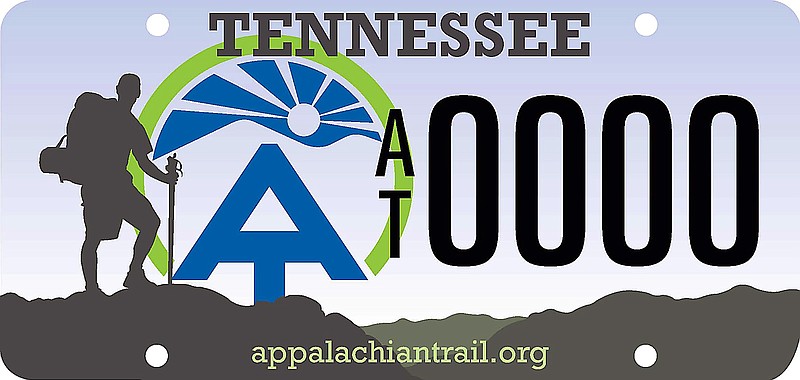Appalachian Trail supporters are launching efforts in Tennessee and Georgia to establish specialty license plates to help support trail work by the Appalachian Trail Conservancy.
"We are so close to finalizing the identical goal of 1,000 license plates in each state," said Leanna Joyner, license plate program manager with the conservancy. "We hope a final push of additional attention will see us over the finish line and get these license plates into production."
In both states, all specialty tags must have 1,000 paid applications before production starts. So far, there are 724 paid applications for Tennessee Appalachian Trail tags, and Georgia now boasts 658 paid specialty tag applications, according to Ms. Joyner.
In both states, supporters must have all 1,000 signatures by mid-April 2011.
"I think we're going to make it," she said Thursday. "Being over 700 in Tennessee gives me the utmost confidence."
PDF: TN plate special offer PDF: GA A.T. Plate App
Tennessee offers more than 90 specialty license plates, most representing colleges and universities, branches of the military, special interest organizations such as the Trail, and professional organizations. Each plate must be approved by the General Assembly.
Similarly, Georgia offers more than 120 specialty tags. About 15 of them, such as the Appalachian Trail tag, are subject to the receipt of enough applications for a manufacturing order. In Georgia, approval is given by the Motor Vehicle Division, not lawmakers.
The initial 1,000-tag application process is designed to cull out tags that wouldn't be popular enough to cover the cost of their production, officials said.
The Appalachian Trail, at about 2,178 miles, is the nation's longest marked footpath. It begins atop Springer Mountain in Georgia's Chattahoochee National Forest near Ellijay and tracks north along the Appalachian Mountains to Mount Katahdin in Maine.
Along the way, the trail's first 78 miles wind through Georgia and the next 280 miles stretch along Tennessee's highest mountains.
The license-plate programs will benefit each state's natural resource by broadening trail awareness on vehicles from Memphis to Bristol and Savannah to Trenton, supporters say.
There will be financial support, as well.
The specialty plate will cost $35 annually in Tennessee, of which $15.56 will benefit the Appalachian Trail Conservancy's program and trail maintenance. Early buyers get a discount of $20 thanks to a donor's grant to match costs.
Although Georgia doesn't yet have a specialty tag profit-sharing program in place that would benefit the conservancy and its affiliate Georgia Appalachian Trail Club, volunteers say they will pursue profit-sharing legislation from the state.
Georgia applicants must pay a one-time manufacturing fee of $25 plus the annual $25 tag fee.
Elizabeth O'Connor, of Chattanooga, is a supporter of the tag and an avid hiker who gradually is taking on sections of the Appalachian Trail.
"It's where I go when life is out of balance," she said in a prepared statement. "At 100 miles of trail hiked each year, I'll be 60 years old before I finish the 2,100 miles of the A.T. And that's OK, because it is my cherished adventure."
A similar specialty tag program for the Appalachian Trail in North Carolina has been in place for several years, Ms. Joyner said.
"At $20 per plate (toward the trail) the Conservancy receives annually about $100,000 to put toward conservation, public information and trail maintenance projects," she said.
Once each state receives 1,000 paid trail tag applications and the states begin producing tags, the Appalachian Trail Conservancy's share of the renewal fees will serve as permanent funding sources for work to protect and maintain the trail in the Volunteer and Peach states.
APPALACHIAN TRAIL FACTS
* It was completed in 1937.
* It is a privately managed unit of the U.S. National Park System.
* Totaling 2,178 miles, it touches 14 states, and is the habitat of more than 2,000 rare, threatened, endangered and sensitive plant and animal species at about 535 sites.
* It crosses six other units of the national park system and traverses eight national forests.
* It is maintained by 30 trail clubs and multiple partnerships.
* Its highest elevation is 6,625 feet at Clingmans Dome in Tennessee.
* Its lowest elevation is 124 feet near the base of Bear Mountain in New York.
* Favorite Tennessee sites include Spence Field's grassy meadows, Rocky Top, Clingmans Dome and the rhododendron-rich Roan Highlands.
* Georgia trail highlights include Springer Mountain, Blood Mountain and Long Creek Falls.
* More than 6,000 volunteers contribute about 200,000 hours to the Appalachian Trail every year.
* It takes about 5 million footsteps to walk the entire length of the trail.
* More than 10,000 people have reported hiking the length of the trail.
Source: Appalachian Trail Conservancy
